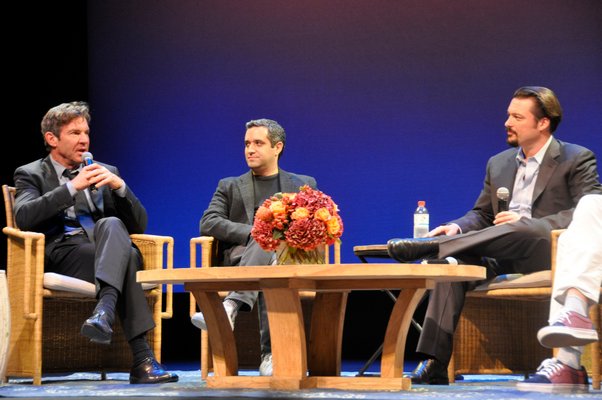
It was his first day on set, and James Vanderbilt was staring straight down the barrel at Cate Blanchett, Dennis Quaid, Elisabeth Moss and Topher Grace, which was rather remarkable, considering that he had never directed a film before—not counting that “really bad short” in college, as he recalls it.
By the end of the second day, he was having a drink in his trailer with Mr. Quaid.
“He looked at me—I will never forget this—and said, ‘You’re okay, it’s going well. You’re good,’” Mr. Vanderbilt said. “And I was like, ‘Oh my God, Dennis Quaid just said I’m doing a good job! What do I do?’
“But it was such a moment of ‘Okay, I think I can do this. I think we can get through this—and it was such a gift for you to say that.’”
Mr. Vanderbilt locked eyes with Mr. Quaid as he thanked him last Thursday night, October 8, on stage at Guild Hall in East Hampton. The actor nodded, stroked his chin and smirked at the audience—perhaps because he knew he had been right.
The 121-minute biopic “Truth,” which chronicles the 2004 investigation by “60 Minutes” into then-President George W. Bush’s military service that essentially cost anchor Dan Rather (Robert Redford) and producer Mary Mapes (Ms. Blanchett) their careers, opened the 23rd annual Hamptons International Film Festival to a packed house buzzing with energy after watching a story they thought they had known.
For a brief moment in time, Mr. Vanderbilt was one of them—until he picked up a copy of “Truth and Duty: The Press, the President, and the Privilege of Power” by Ms. Mapes in 2005.
He knew the material for a film was there, and he decided to write it: a story about integrity and loyalty. A story about a cover-up in plain sight that indicted not only the powers that be but also the corporate structure that was once the network news.
And after he wrote it, all he needed were his lead actors—starting with Ms. Blanchett, according to producer Brad Fischer.
“It, actually, was right after Cate had won the Oscar for ‘Blue Jasmine,’ which is a great time to send an actress a script,” Mr. Fischer deadpanned. “We said, if she responds to the screenplay, she’s responding to Jamie’s vision as a storyteller and a filmmaker. And she did. And we were incredibly lucky.”
With Ms. Mapes cast, Mr. Redford wasn’t far behind—Mr. Vanderbilt’s first choice for the role.
“It was, like, a Thursday, and my phone rang and it was a blocked number,” the director said. “I picked it up, and it was that voice going, ‘Hey, Jamie, it’s Bob Redford.’ And I think I fell out of my chair.”
For each actor who came on board, it was an intensely personal decision, Mr. Quaid said, who was on a plane and headed for the set 36 hours after he accepted his role as Lieutenant Colonel Roger Charles, who assisted with the “60 Minutes” investigation.
“I just wanted to be a part of it,” he said. “I grew up in Houston. Dan Rather was the very first newsman I remember, from Hurricane Carla, the Kennedy assassination, his reporting in Vietnam. He was an icon to me, but even more than that, it was this script Jamie had written.
“It was the truth—as close as you can get to it without politicizing it, without really taking sides,” he continued. “In a way, it was real journalism.”
Mr. Vanderbilt said he was careful not to treat the film as a “homework assignment” that lectures the audience for two hours, nor did he unnecessarily dramatize—or demonize—any of the characters, many of whom assisted from behind the scenes.
“But it was really important that they knew they weren’t going to have any editorial involvement in this,” Mr. Fischer explained. “That they were giving us a great degree of trust by doing this. You go to someone and say, ‘We want to make a film about one of the darkest periods in your professional life, if not the darkest.’”
“‘How would that be?’ ‘That would be great,’” Mr. Quaid sarcastically reenacted.
“It’s a pretty steep ledge to peer off of,” Mr. Fischer said. “They were there, but they didn’t impose themselves, and we kept somewhat of a distance, but also wanted them to have the opportunity to come and see what it was like on set.”
The day Mr. Quaid said yes to the part, he talked with Mr. Charles for two hours about his drive to investigate President Bush, who reportedly skirted deployment to Vietnam and enlisted in the Air National Guard, thanks to his connections—unlike Mr. Charles.
“[Mr. Charles] was in Vietnam. He was one of those poor kids who couldn’t buy his way out with a daddy who had it. And nobody wanted to go to Vietnam back then,” Mr. Quaid said. “I, myself, I’m 61. When I went for the draft, I was relieved that they were starting the volunteer arm.
“But that was exactly the point. It wasn’t fair,” he continued. “It was supposed to be for everyone, and there were a lot of other kids who had merit. There wasn’t the space for them in the Air National Guard, because others of privilege got in.”